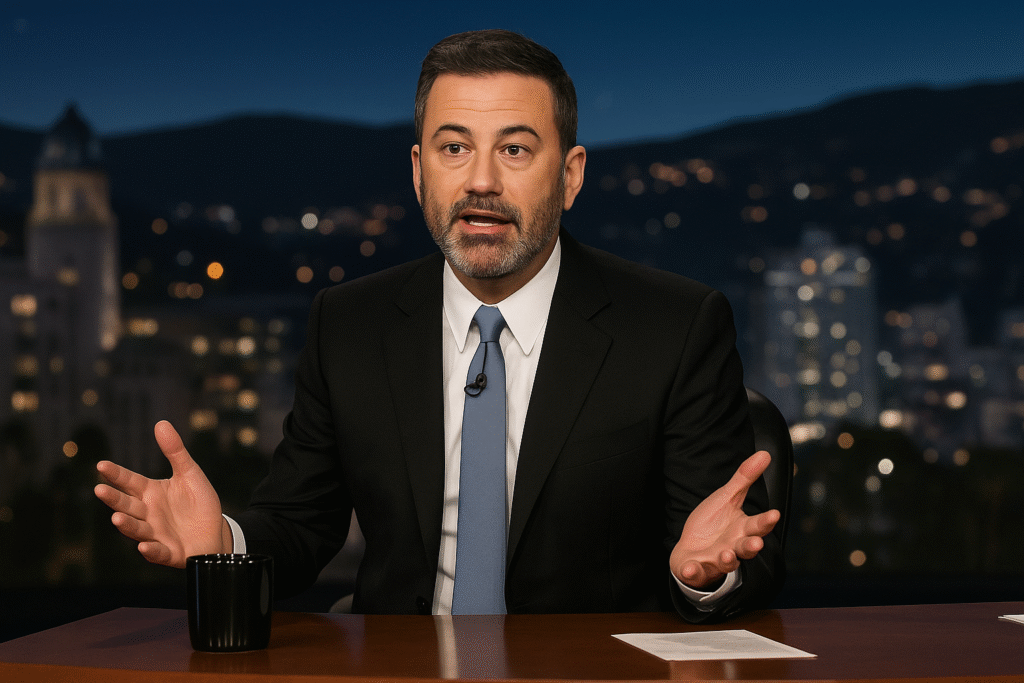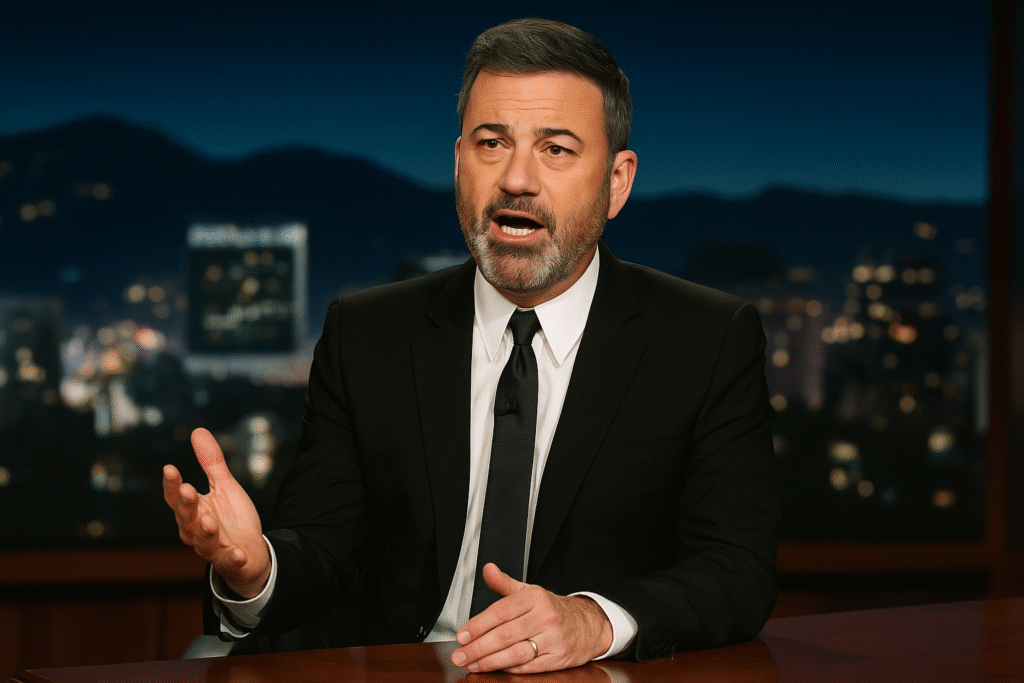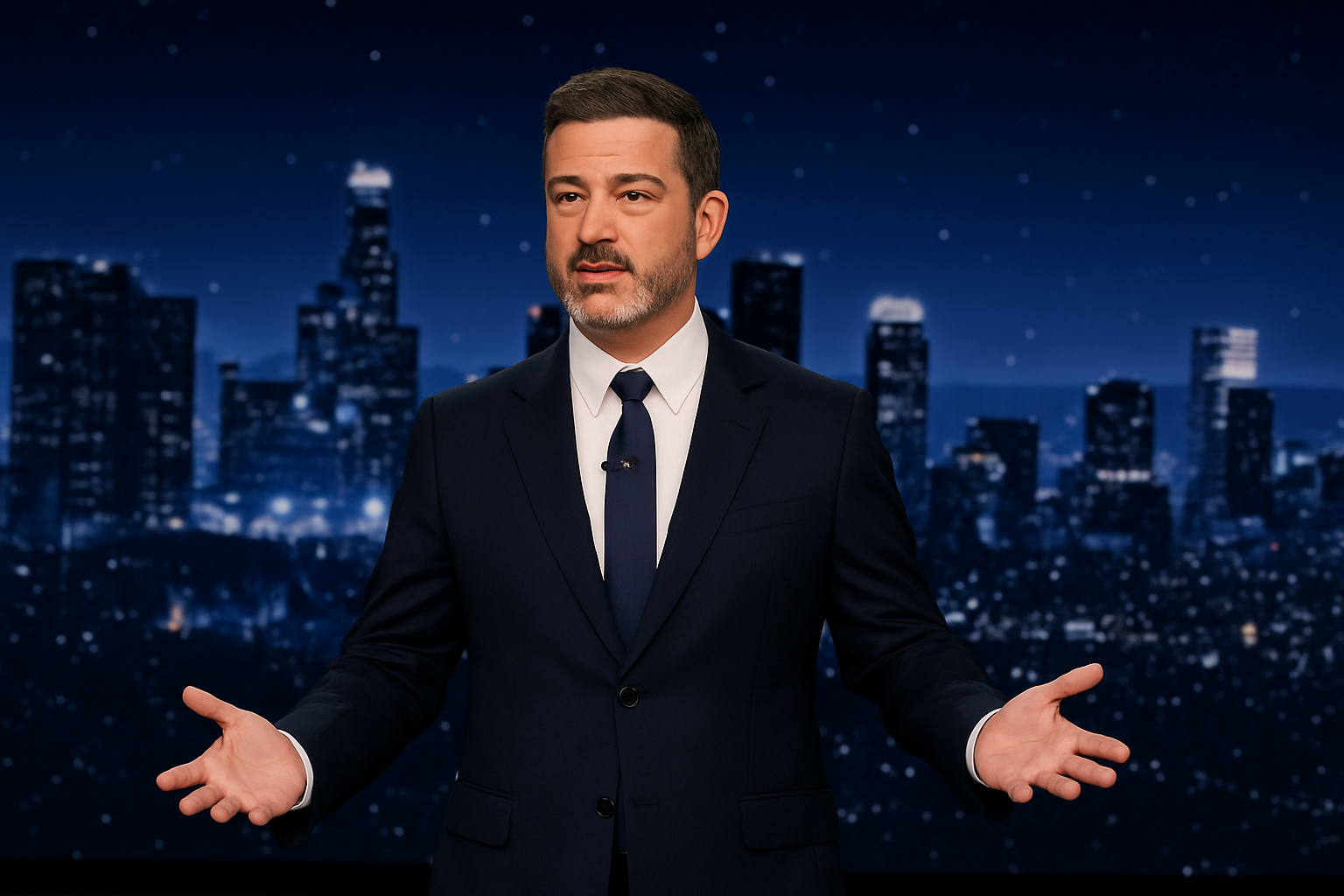Jimmy Kimmel Suspension: Late-night host Jimmy Kimmel’s monologue about the killing of conservative activist Charlie Kirk touched off a national media firestorm this week. The fallout was fast: major ABC affiliates announced they would stop airing Jimmy Kimmel Live!, and ABC/Disney confirmed the show would be pre-empted “indefinitely.” The moves — driven in part by public pressure from big station groups and the Federal Communications Commission chair — rapidly turned a late-night monologue into a test case about broadcast standards, political speech and the power of corporate and regulatory pressure. This guide unpacks the timeline, the substance of Kimmel’s remarks (what we know he said and what he didn’t), why affiliates moved so decisively, how the FCC factor changed the calculus, and the downstream implications for broadcasters, hosts and viewers.
1) The short version — what happened (in one paragraph)
After Jimmy Kimmel’s recent monologue about Charlie Kirk’s killing — in which he criticized political reactions and suggested conservative figures were seeking to politicize the tragedy — several major ABC affiliates (including Nexstar and Sinclair-owned stations) announced they would stop airing Jimmy Kimmel Live!. Within hours ABC confirmed it would pre-empt the show “indefinitely” across its network. FCC Chair Brendan Carr publicly criticized Kimmel’s comments and warned broadcasters about potential regulatory consequences, increasing pressure on affiliates and the network. ABC described the move as a decision to pre-empt the late-night program for the time being.
2) Exactly what Kimmel said — the accurate, short summary
Jimmy Kimmel Suspension: Kimmel’s recent monologue criticized what he called the political exploitation of Charlie Kirk’s death and said that some conservative commentators were “trying to score political points” from the assassination. He also suggested that the political narrative being pushed by some Republicans did not fit the facts as they were emerging. Multiple outlets have published transcripts and video of the monologue; the essence is that Kimmel attacked the rhetorical response from parts of the right while criticizing attempts to frame the killing in partisan terms. Reporting shows he made those comments before investigators released certain text messages and evidence that complicated early narratives.
3) Who pulled the show and why (Nexstar, Sinclair, ABC)
- Nexstar Media Group and Sinclair Broadcast Group — two of the largest local-station owners in the U.S. — publicly announced they would pre-empt Jimmy Kimmel Live! on their ABC affiliates, citing objection to Kimmel’s remarks. These station groups emphasized viewer trust and local standards in their statements.
- ABC / Disney — the network issued a statement saying the show would be “pre-empted indefinitely.” While ABC framed the decision as programming discretion, the network faced intense pressure from affiliates and a high-profile public warning from the FCC chairman.
The sequence (host remarks → affiliate statements → ABC pre-emption) shows how fast broadcast decisions can change when station groups, advertisers and regulators converge on a controversy.

4) The FCC’s intervention — why Brendan Carr’s comments mattered
FCC Chair Brendan Carr publicly criticized Kimmel’s monologue and warned broadcasters that airing the show could raise concerns about compliance with public-interest obligations and invite FCC scrutiny. Carr’s comments were unusual in tone and consequence: a sitting FCC chair suggesting possible action against a broadcaster over on-air commentary amplifies the political stakes because the commission has authority over broadcast licenses and certain enforcement tools. Carr’s public pressure was cited by affiliates and commentators as an influential factor in their decision to pre-empt the show.
Note: FCC officials are appointed to enforce statutory rules about broadcasting, but the First Amendment and long-standing protections for editorial speech make regulatory action over news or commentary rare and legally complicated. Carr’s public threats — and his praise for stations that pre-empted the show — are therefore notable for how they changed the incentives for ABC and its affiliates.
5) Why the timing made the reaction so intense
Several factors combined to accelerate the reaction:
- High emotions around the Kirk killing. Charlie Kirk’s assassination was already a highly politicized national story; comments from national media figures were being scrutinized in real time.
- Early, competing narratives. Kimmel spoke while investigators were still releasing evidence. Later revelations — including text messages attributed to the suspect — complicated the political assumptions that had been floated. Critics argued Kimmel’s monologue leapt to conclusions about motive before facts were public.
- Regulatory spotlight. The FCC chair’s quick and public intervention changed the risk calculus for station groups and ABC, who must weigh public-interest obligations, advertiser reactions, and regulatory scrutiny.
Combined, those elements explain why broadcast partners reacted faster and more decisively than they commonly do for late-night monologues.
6) Political and public response — how leaders and viewers reacted
Reactions split sharply along political lines:
- Conservative leaders and commentators pressed for sanctions and praised stations that pre-empted the show; former President Trump congratulated networks that pulled Kimmel’s program.
- Free-speech advocates and many media organizations warned that regulatory threats to punish a network for a host’s political commentary risk chilling dissent and undermining journalistic independence. Several commentators called the suspension an alarming precedent for government influence over broadcast content.
- Mainstream media explained the complicated timeline — that Kimmel’s remarks preceded some forensic evidence — and raised questions about responsible timing when discussing live criminal investigations.
The polarized response underscores how a single monologue can become an inflection point in debates about censorship, corporate responsibility and political influence.
7) Legal and regulatory realities — what the FCC can (and cannot) do
The FCC regulates broadcast licensing and enforces certain rules — but its authority is not unlimited:
- Public-interest obligations: Broadcasters must serve the public interest; license challenges or fines are rare but possible in egregious cases.Carr’s warnings referenced potential enforcement tools, but any formal action would face heavy legal scrutiny and likely First Amendment defenses.
- Indirect pressure vs. formal enforcement: Public comments by the FCC chair can intimidate stations, even if formal enforcement is unlikely or legally challenging. In this instance, Carr’s public pressure had the immediate effect of altering programming choices even without formal proceedings.
Bottom line: the FCC can open investigations or pursue enforcement, but doing so against commentary risks constitutional challenges that would be litigated over many months.

8) What ABC and Disney face — business, legal and reputational tradeoffs
ABC/Disney had to weigh several competing risks when deciding to pre-empt the show:
- Affiliate relations: Station groups control local airtime; if major owners refuse to run a show nationally, networks face distribution and revenue impacts. Nexstar and Sinclair together cover large swaths of U.S. TV households.
- Regulatory risk: Public pressure from the FCC chair raises regulatory uncertainty for Disney at a moment when media mergers and licensing scrutiny are headline issues.
- Audience and advertiser reaction: ABC must consider whether advertisers would pull buys and whether viewers in affiliate markets would respond negatively.
- Editorial independence and precedent: Suspending a high-profile host raises concerns internally and across media circles about editorial freedom and the network’s willingness to protect hosts’ speech.
These tradeoffs explain why ABC opted for a quick pre-emption rather than a prolonged defense of the host’s remarks.
9) How the late-night landscape could change
This incident may create ripple effects for late-night TV:
- Hosts may self-censor on live commentary tied to ongoing criminal investigations or politically charged events.
- Networks might tighten editorial review for monologues that comment on active law-enforcement matters.
- Local stations may demand greater control over controversial programming, influencing national content decisions.
The episode is likely to generate internal reviews across networks and local groups about what is acceptable on entertainment platforms that also function as news and opinion outlets.
10) What to watch next — four concrete signals
- ABC’s follow-up statement: Will the network restore the show, modify its format, or announce disciplinary steps? Watch ABC corporate communications.
- FCC actions: Will the FCC open formal inquiries or issue letters to Disney/ABC? Public filings or notices would be significant.
- Affiliate decisions: Will other station owners follow Nexstar and Sinclair, or will some markets carry the show via alternate feeds? Deadline and Variety will track affiliate lineups.
- Legal filings: If the FCC pursues enforcement or if advertisers take contractual action, filings and court papers will clarify the legal theories and defenses.
11) Responsible coverage checklist for publishers
If you publish about this controversy, follow these practices:
- Attribute claims to primary sources (FCC tweets/statements, affiliate press releases, ABC/Disney statements).
- Avoid repeating unverified accusations about motive or private communications without sourcing.
- Include context about First Amendment and FCC limits so readers understand legal realities.
- Separate opinion from reporting — label commentary clearly to protect credibility and AdSense compliance.
12) Final assessment — why this matters beyond late night
This episode is more than clickbait about a late-night host. It’s a rapid case study in how modern media ecosystems — where local station owners, corporate networks, regulators and political leaders can all exert power — interact in crises. The suspension illustrates:
- The speed at which corporate, regulatory and political pressures can produce programming decisions.
- The fragile balance between editorial independence and business/regulatory constraints.
- The broader societal debate over how public figures and media should discuss violent events in real time.
Expect further developments. In the meantime, the incident will likely be studied by media scholars, broadcast lawyers and newsroom editors as a landmark moment in contemporary broadcast governance.
Do you think ABC’s decision to pre-empt Jimmy Kimmel’s show was justified?
Verified external links
(Only publicly accessible, authoritative reporting and statements used in this article.)
- Reuters — “Disney’s ABC yanks ‘Jimmy Kimmel Live’ off air after remarks about Kirk.” (Reuters)
https://www.reuters.com/world/us/disneys-abc-yanks-jimmy-kimmel-live-off-air-after-remarks-about-kirk-2025-09-18/ - AP News — “ABC suspends Jimmy Kimmel’s late-night show indefinitely over his remarks about Charlie Kirk’s death.” (AP News)
https://apnews.com/article/a2bfa904429c318fe52e7d3493c6883d - Washington Post — “ABC takes Jimmy Kimmel off the air over remarks on Charlie Kirk’s killing.” (The Washington Post)
https://www.washingtonpost.com/business/2025/09/17/jimmy-kimmel-abc-charlie-kirk/ - Variety — “FCC Chairman Threatens ABC Over Jimmy Kimmel Remarks.” (Variety)
https://variety.com/2025/tv/news/brendan-carr-abc-fcc-jimmy-kimmel-charlie-kirk-1236522406/ - Deadline — “Jimmy Kimmel Pulled ‘Indefinitely’ By ABC After Charlie Kirk Comments.” (Deadline)
https://deadline.com/2025/09/jimmy-kimmel-live-off-abc-charlie-kirk-comments-1236547397/
Disclaimer
This article summarizes verified reporting and public statements as of September 2025. It is informational and not legal advice. The situation is fluid; networks, station groups and regulators may release further statements or take additional action after publication. TrenBuzz.com seeks accuracy — if you have verifiable, primary-source updates, please share them for prompt correction. Images used in this article are royalty‑free or licensed for commercial use and are provided here for illustrative purposes.
